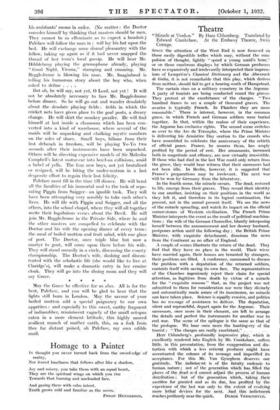Theatre
"Miracle at Verdun." By Hans ChIumberg. Translated by Edward Crankshaw. At the Embassy Theatre, Swiss ' Cottage. - • SINCE the attention of the West End is now focussed on those easily digestible trifles which may, withciut the- Clim pulsion of thought, lightly " speed a young maid's hour," or on those cumbrous displays by which- German producers have so expansively and irrelevantly interpreted their iinpress- ions of Lempriere's Classical Dictionary and the Almanach de Gotha, it is not remirkable that this play, which -derives from neither, should fail to get a hearing south of Hampstead.
The curtain rises on a military cemetery in the -Argonne A party of tourists are being conducted' round -the gray es. They protest at the exorbitance of the charges:- " TWO hundred francs to see a couple of thousand graves. The avarice is typically French: In Flanders they are more reasonable." There is interest, however, in the common grave, in which French and German soldiers were buried together. In that, within the realms of their experience, the Argonne has exclusive rights. The second scene switches us over to the Arc de Triomphe, where the Prime Minister is delivering his Armistice Day oration to the crowds who have assembled to celebrate the anniversary' of the rebirth of official peace. France, he assures them, has amply profited by the period of rest. Her armaments, increased both in magnitude and efficacy, are now virtually irresistible. If those who had died in the last War could only return from the grave, they would bear witness that theit successors had not been idle. In Berlin, however, it is suggested that France's preparations may be irrelevant. The next war will he won by Germany from the laboratory.
In the fourth scene, the miracle occurs. The dead, restored to life, emerge from their graves. They reveal their identity to one another, insisting on their positions in the world as they left it, and therefore in its logical continuation, the present, not in the unreal present itself. We see the news of the miracle spreading, and watch its impact on the official corner-stones of Western civilization. The French Prime Minister interprets the event as the result of political machina- tions ; the wife of the German Chancellor, bluntly interposing herself between the announcement and her drowsy husband, postpones action until the following day ; the British Prime Minister, with exquisite detachment, dismisses the news from the Continent as no affair of England.
A couple.of scenes illustrate the return of the dead. They find that they have no place in the world. Their wives' have married again, their houses ate tenanted by strangers, their positions are filled. A conference, summoned to discuss the problem with a deputation of the returned soldiers, contents itself with saving its own face. The representatives of the Churches ingeniously reject their claim for special attention, as fugitives from death by. virtue of a miracle for the " exquisite reasons " that, . as the project was not submitted to them for consideration nor were they divinely and automatically ;made aware of its :imminence, no miracle can haye taken place. Science is equally evasive, and politics has no ree3sage of assistance to deliver. The deputation, silent and reproachful, depart again for the Argonne: Their Successors, once more in their element, are left to arrange the details and perfect the instruments for another war to end_ war. The scene of the epilogue is the same as that of the .prologue. We hear once_ more the hunting-cry of the tourist ; "The charges are realty exorbitant."
flerr Chlumberg's profoundly impressiye play, which is exCellently rendered into English by Mr. Crankshaw, suffers little, . in this presentation, from the exaggeration and dis- tortion with which a- less reticent producer might have accentuated the colours of its message and imperilled its acceptance. For Van Gysegherri - deserves our gratitude., _ The .indieturnt is of the fatuity endemic to huMan nature; not of the generation. which filled the places of the dead ar d cannot _adjust the process of human distribution ; but of the generation Which, V taking , their sacriflee for granted and as RS due, has profited by the experience of the last war only to the extent of evolving more lethal devices for the . next. And this indictment














































 Previous page
Previous page